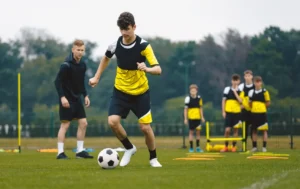
Story at-a-glance
- Working memory is like your brain’s temporary workspace – It holds and manipulates information for short periods while completing tasks, different from both short-term memory and long-term memory storage.
- Intelligence and memory are separate systems – Highly intelligent children can have significant working memory challenges, leading to frustrating gaps between their understanding and their ability to demonstrate knowledge.
- Forgetting isn’t carelessness or defiance – When your child loses homework, forgets multi-step instructions, or can’t remember what they just read, their working memory system may genuinely be overwhelmed.
- Recognition opens doors to solutions – Understanding working memory challenges helps parents provide appropriate support, reduce frustration, and help children develop compensatory strategies that build on their strengths.
You know your child is bright. They can discuss complex topics, solve challenging puzzles, and demonstrate deep understanding of subjects that interest them. Yet somehow, they consistently forget to bring home their homework, lose track of instructions halfway through following them, or read an entire page only to have no idea what they just read. If this sounds familiar, you might be dealing with working memory challenges – a hidden struggle that affects many intelligent children and often leaves both parents and kids feeling frustrated and confused.
Working memory challenges are particularly baffling because they create such inconsistent patterns. Your child might remember every detail about their favorite video game or movie but forget a simple three-step instruction you gave them five minutes ago. This isn’t about caring more about fun things than responsibilities – it’s about how different types of memory systems work in the brain.
Understanding working memory and how it can impact your child’s daily functioning can transform your perspective on their struggles and open up new avenues for support and success.
What Is Working Memory, Really?
Working memory is often misunderstood because it sounds like it should be the same as short-term memory, but it’s actually much more complex. Think of working memory as your brain’s mental workspace – a system that temporarily holds information while you manipulate, process, or work with it.
Imagine you’re doing mental math: calculating 15% tip on a $47 restaurant bill. Your working memory has to hold the numbers 47 and 15, remember that you need to multiply 47 by 0.15, keep track of where you are in the calculation process, and maintain your running total – all while potentially dealing with distractions like restaurant noise or conversation. That’s working memory in action.
For children, working memory is constantly in use. When they’re following directions to clean their room (“First put all the clothes in the hamper, then make your bed, then put your books back on the shelf”), their working memory has to hold all three steps while they complete each one. When they’re reading a story, working memory holds the beginning of the sentence while they process the end, allowing them to understand the complete thought.
The key difference between working memory and other types of memory is that working memory is active and temporary. It’s not about storing information for later (that’s long-term memory) or simply holding onto something briefly (that’s short-term memory). It’s about holding information while actively doing something with it.
Why Smart Kids Struggle with Working Memory
One of the most confusing aspects of working memory challenges is that they often occur in children who are clearly intelligent. Parents frequently describe their children as “smart but scattered” or say things like “I know they understand it, but they just can’t seem to put it all together.”
This happens because intelligence and working memory are separate cognitive systems. Intelligence involves pattern recognition, reasoning, problem-solving, and acquired knowledge. Working memory, on the other hand, is more like the brain’s RAM (random access memory) in a computer – it’s about processing capacity, not processing power.
A child might have exceptional reasoning abilities and vast knowledge but still struggle to hold multiple pieces of information in mind while working with them. This creates a frustrating gap between what they can understand and what they can demonstrate or accomplish in real-time.
How Working Memory Challenges Show Up at Home
The Disappearing Instructions
You give your child a simple request: “Please go upstairs, brush your teeth, put on your pajamas, and bring down your library book.” They nod and head upstairs with every intention of following through. Twenty minutes later, you find them in their pajamas but their teeth aren’t brushed, and there’s no sign of the library book. They’re not being defiant – their working memory simply couldn’t hold all four steps while they were completing the task.
These children often do better with one instruction at a time: “Please go brush your teeth,” followed by “Now put on your pajamas,” and so on. It’s not that they can’t understand complex instructions; their working memory just can’t juggle all the pieces simultaneously.
The Homework Mysteries
Working memory challenges can make homework time particularly frustrating. Your child might read a math word problem several times but still not be able to solve it, not because they don’t understand the math concepts, but because they can’t hold all the problem details in mind while figuring out what operation to use.
They might start writing an essay with a clear idea of what they want to say, but by the time they get to the third sentence, they’ve lost track of their main point. Or they might spend an hour on homework only to forget to put it in their backpack or turn it in the next day.
The Lost and Found Life
Children with working memory challenges often struggle with organization and keeping track of belongings. They might put their jacket down and genuinely not remember where they left it five minutes later. This isn’t about not caring – their working memory was focused on other things and didn’t encode the location information effectively.
You might notice your child frequently loses lunch boxes, water bottles, homework assignments, or permission slips. They might leave a trail of belongings behind them, not out of carelessness but because their working memory is occupied with other tasks.
Academic Impacts of Working Memory Challenges
Reading Comprehension Struggles
One of the most common academic impacts of working memory challenges involves reading comprehension. Your child might be an excellent decoder who can read words fluently but struggles to understand what they’ve read. This happens because working memory is crucial for connecting information across sentences and paragraphs.
While reading, working memory holds the beginning of a sentence while processing the end, connects current information to what was read earlier, and builds an ongoing understanding of the text. When working memory is overwhelmed, children might read all the words correctly but lose the thread of meaning.
Math Difficulties
Math is particularly demanding of working memory because it often requires holding multiple pieces of information while manipulating them. Word problems are especially challenging because children need to hold the story details in mind while figuring out what mathematical operation to perform.
Even basic math facts can be affected. A child might understand mathematical concepts perfectly but struggle to retrieve math facts quickly enough to keep up with multi-step problems, not because they don’t know the facts but because the retrieval process taxes their already-strained working memory.
Writing Challenges
Writing places enormous demands on working memory. Children need to hold their ideas in mind while forming letters, remember spelling patterns, follow grammar rules, and maintain their overall message. It’s like trying to juggle while riding a unicycle – even skilled performers can drop balls when the cognitive load becomes too high.
You might notice your child can tell wonderful, complex stories orally but produce very simple written work. Their working memory is so occupied with the mechanics of writing that they can’t access their full expressive abilities.
The Emotional Side of Working Memory Challenges
Children with working memory challenges often develop secondary emotional responses to their struggles. They might become anxious about tasks that seem to overwhelm their cognitive system, or they might avoid challenging activities altogether to prevent the frustration of cognitive overload.
Many of these children are acutely aware that they’re struggling with things that seem easy for their peers. They might say things like “I’m stupid” or “I can’t do anything right,” even though they demonstrate clear intelligence in other areas. This disconnect between their abilities and their performance can be particularly damaging to self-esteem.
Some children develop perfectionist tendencies as a way of coping with working memory challenges. They might spend excessive time on tasks, checking and rechecking their work because they don’t trust their memory of what they’ve already done.
Working Memory vs. Other Learning Challenges
Working memory challenges can look similar to other learning differences, which sometimes leads to misunderstanding or misdiagnosis. Children with working memory issues might appear inattentive like those with ADHD, but their attention difficulties are specifically related to cognitive overload rather than general attention regulation.
They might seem to have processing speed issues because they work slowly, but the slowness often comes from their need to re-read, re-check, or restart tasks when their working memory becomes overwhelmed. Understanding the root cause is important for developing appropriate support strategies.
Working memory challenges can also co-occur with other learning differences. A child might have both ADHD and working memory challenges, or dyslexia and working memory issues. This is why comprehensive evaluation is often helpful in understanding the full picture of a child’s learning profile.
Strategies That Support Working Memory
Breaking Down Complex Tasks
One of the most effective strategies for supporting working memory is breaking complex tasks into smaller, manageable chunks. Instead of giving multiple instructions at once, provide one step at a time and check for completion before moving to the next step.
For homework, this might mean covering up all but one math problem at a time, or breaking writing assignments into smaller stages like brainstorming, organizing, drafting, and editing as separate activities rather than trying to do everything simultaneously.
External Memory Supports
Since working memory is limited, providing external supports can be incredibly helpful. This might include written checklists, visual schedules, graphic organizers, or note-taking templates that help organize information outside of working memory.
For younger children, picture schedules can serve as external memory for routines. For older children, apps, planners, or organizational systems can help manage the cognitive load of keeping track of assignments and responsibilities.
Reducing Cognitive Load
Look for ways to reduce unnecessary cognitive demands so that working memory can focus on the most important aspects of a task. This might mean providing pre-written word banks for writing assignments, allowing the use of calculators for multi-step math problems, or giving children copies of notes so they don’t have to hold information in working memory while writing.
Building on Strengths
While working memory challenges create real difficulties, many children with these issues have significant strengths in other areas. They might be excellent big-picture thinkers, creative problem-solvers, or have exceptional knowledge in areas of interest.
Recognizing and building on these strengths can help children develop confidence and find alternative pathways to success. A child who struggles with working memory but has strong visual-spatial skills might benefit from graphic organizers, mind maps, or other visual tools that support their learning style.
When to Seek Professional Support
If working memory challenges are significantly impacting your child’s academic performance, self-esteem, or daily functioning, it might be helpful to seek evaluation from a psychologist or educational specialist who can assess cognitive functioning and working memory specifically.
Professional evaluation can help distinguish working memory challenges from other learning differences and provide specific recommendations for support. Sometimes, understanding the nature and extent of working memory challenges can help schools provide appropriate accommodations.
Technology Tools That Can Help
There are many technology tools that can serve as external working memory supports. Voice-to-text software can help children who have strong ideas but struggle with the working memory demands of writing. Organizational apps can help with planning and time management. Audio books can reduce the working memory load of reading while still allowing access to grade-level content.
The key is finding tools that truly support your child’s working memory rather than adding additional cognitive load. Sometimes low-tech solutions like sticky notes or simple checklists are more effective than complex digital tools.
The Home Environment
Creating a supportive home environment for children with working memory challenges often involves reducing distractions and providing predictable structures. This might mean having designated spaces for homework that are free from visual and auditory distractions, or developing consistent routines that reduce the working memory load of remembering what comes next.
It’s also important to recognize when your child’s working memory is likely to be most taxed. Many children with working memory challenges are more successful with demanding tasks earlier in the day when their cognitive resources are fresh rather than after a long day at school.
Looking Toward the Future
Understanding working memory challenges early can make a significant difference in a child’s academic and personal success. With appropriate support and understanding, children with working memory challenges can develop effective compensatory strategies and learn to work with their cognitive profile rather than against it.
Many successful adults have working memory challenges and have learned to use external supports, technology tools, and organizational strategies to manage their professional and personal lives effectively. The key is helping children understand their learning profile and develop confidence in their ability to succeed despite cognitive challenges.
Your bright child who forgets everything isn’t careless, lazy, or unmotivated. They’re dealing with a real neurological difference that affects how they process and manage information. With understanding, appropriate support, and strategies that work with their cognitive style, they can absolutely thrive academically and personally.
Working memory challenges don’t define your child’s potential – they’re simply one aspect of their unique learning profile that requires understanding and accommodation. With your support and advocacy, your child can learn to navigate their cognitive challenges while building on their many strengths and abilities.
Sources
- Gathercole, S. E., & Alloway, T. P. (2021). Working Memory and Learning: A Practical Guide for Teachers (2nd ed.). SAGE Publications.
- Dehn, M. J. (2017). Working Memory and Academic Learning: Assessment and Intervention. John Wiley & Sons.
- Baddeley, A., Eysenck, M. W., & Anderson, M. C. (2020). Memory (3rd ed.). Psychology Press.
- Alloway, T. P. (2011). Improving Working Memory: Supporting Students’ Learning. SAGE Publications.
- Holmes, J., & Gathercole, S. E. (2014). Taking working memory training from the laboratory into schools. Educational Psychology, 34(4), 440-450.
Note: This blog post is intended for educational purposes only. While the information presented is based on scientific research, individual situations vary. Please consult with qualified professionals for proper assessment and individualized recommendations.



